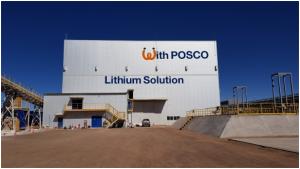
POSCO Holdings is pushing for a plan to directly extract lithium, a key material for electric vehicle (EV) batteries, in the United States. The move is a response to the implementation of the Inflation Reduction Act (IRA) in the U.S. The act regulates the country of origin for minerals to lower dependence on China’s battery raw materials.
POSCO Holdings announced on Feb. 14 that it will promote the lithium clay business in the United States together with Jindalee Resources (JLR), an Australian company specializing in mineral exploration. JLR owns 100 percent of the McDermitt Clay Lithium Project on the border of Oregon and Nevada in the western region of the United States.
Under the agreement, JLR will provide clay lithium extracted from a mine being explored in the United States, and POSCO Holdings will use it to develop an optimal lithium extraction process in collaboration with the Research Institute of Industrial Science and Technology (RIST) in Pohang. If the possibility of commercialization is confirmed, the two companies will carry out business cooperation for the McDermitt project, including joint investment.
The key is the economic value of clay lithium extraction. Since 2010, POSCO Holdings has been working with the RIST to develop a technology to extract lithium from brine, ore, and used batteries. It is building commercial lithium production plants in Gwangyang, Korea, and Argentina based on the know-how obtained through the operation of demonstration plants in Gwangyang and Argentina. The two plants are scheduled for completion in 2024 and 2025, respectively. The Gwangyang plant will have an annual production capacity of 43,000 tons, while the Argentine plant will produce 25,000 tons a year.
Lithium is a key material for secondary batteries and is found in ores, salt lakes, clay, and oil field brine. Until now, companies have extracted lithium from ores and brine but not from clay and oilfield brine due to poor profitability.

IL PRIMO ECOMMERCE SPECIALIZZATO IN DELIZIE AL TARTUFO E CAVIALE – CAVIAREAT.COM
